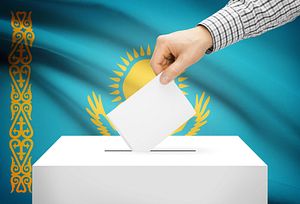Earlier this week, Kazakhstan’s foreign minister attempted to lay out why Kazakhstan would be hosting snap parliamentary elections next month. “Strong leadership and a clear strategy … to overcome the current economic climate,” according to Foreign Minister Erlan Idrissov, are the reasons that “President Nursultan Nazarbayev approved a parliamentary initiative to dissolve the lower house and call an early parliamentary election.” Parsing the rhetoric, it’s not difficult to discern why Astana opted, once more, for ad-hoc elections. Considering the country’s currency has vied with the ruble for the world’s worst-performing, and coming on the back of the recent recession projections, Astana’s hoping to get ahead of the rumbling criticisms about the country’s stewardship. Elections may help sap some of the rising frustration — and provide a veneer of discourse between the government and the governed.
To that end, Idrissov extended an invitation to international election monitors to make sure that the coming vote will let Kazakhstanis “decide on who they believe should guide Kazakhstan[.]” As the foreign minister wrote, the government is “committed to ensuring that the election will be open, transparent, and fair. We are inviting international observers from the OSCE, CIS, SCO and other organizations to monitor the campaign and electoral process across the country.” After all, according to Idrissov, the country wants to display its transition from a “totalitarian to democratic nation” — no matter how “tempting [it is] to view Kazakhstan’s democratic progress through the critical lens of established nation states with centuries-old traditions of pluralistic societies[.]” (Idrissov didn’t mention the raft of political activists recently jailed by the Kazakhstani government, though RFE/RL’s Bruce Pannier generously runs through the list here.)
Fortunately, if recent elections are any indicator, Kazakhstan will likely have little problem finding external electoral monitoring organizations to stamp the government’s efforts at hosting an election. To be sure, the OSCE — the lone legitimate election monitoring organization cited within Idrissov’s piece — has never deemed a Kazakhstani election as free and fair. After the April presidential election, the group concluded that “while the election was technically well-administered, the absence of opposition candidates and of a vibrant political discourse resulted in a non-competitive environment.” The CIS and SCO, meanwhile, have shown little compunction in hailing elections that offer little political opposition, and that see the president re-elected with 98 percent of the vote.
The election’s conclusions are, almost certainly, foregone; as The Diplomat’s Catherine Putz wrote, “Given that Nazarbayev’s party will likely retain its supermajority, it’s unclear where the new debates and fresh ideas will come from.” However, it is the “other organizations” at which Idrissov hints that offers potentially the greatest interest to election-watchers.
After all, during Kazakhstan’s last election, the country saw a remarkable intake of “zombie monitors” willing to praise an electoral result that saw Nazarbayev claim nearly 100 percent of the vote. A handful of Western observers parachuted into Kazakhstan, publicly welcoming the “openness” of a “very important democratic event.” One, Alex Vatanka, a senior fellow at the Middle East Institute, went so far as to claim that “Washington believes the presidential elections were conducted properly.” The election also saw the finest example yet offered of Kazakhstan-friendly whataboutism, with Sophia McClennen, a Pennsylvania State University professor, listing the “prime ways that Kazakhs get democracy better” than the United State.
Perhaps the most effusive praise came from former U.S. Representative Robert Wexler, who told Kazakhstani media, “I don’t know of anywhere else in the world today where there is such diversity and yet there seems to be such harmony.” The Daily Beast described Wexler’s behavior as “shameful,” adding that he was either “completely unaware of the society around him, or a bought man on the payroll of the regime[.]”
Whether any of these monitors will reprise their roles in praising an election whose conclusions are foregone remains to be seen. But if Kazakhstan’s recent history is any indication, Idrissov may well succeed in finding those who believe Kazakhstan’s election is “open, transparent, and fair” — no matter how predetermined the election’s results, and no matter how many political opposition figures remain jailed.

































